宾语从句复习教案
- 格式:doc
- 大小:48.50 KB
- 文档页数:5
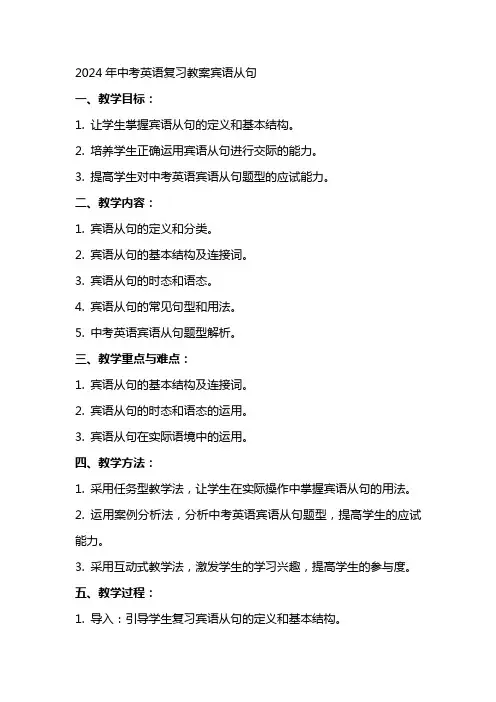
2024年中考英语复习教案宾语从句一、教学目标:1. 让学生掌握宾语从句的定义和基本结构。
2. 培养学生正确运用宾语从句进行交际的能力。
3. 提高学生对中考英语宾语从句题型的应试能力。
二、教学内容:1. 宾语从句的定义和分类。
2. 宾语从句的基本结构及连接词。
3. 宾语从句的时态和语态。
4. 宾语从句的常见句型和用法。
5. 中考英语宾语从句题型解析。
三、教学重点与难点:1. 宾语从句的基本结构及连接词。
2. 宾语从句的时态和语态的运用。
3. 宾语从句在实际语境中的运用。
四、教学方法:1. 采用任务型教学法,让学生在实际操作中掌握宾语从句的用法。
2. 运用案例分析法,分析中考英语宾语从句题型,提高学生的应试能力。
3. 采用互动式教学法,激发学生的学习兴趣,提高学生的参与度。
五、教学过程:1. 导入:引导学生复习宾语从句的定义和基本结构。
2. 新课内容:讲解宾语从句的分类、基本结构及连接词。
3. 案例分析:分析中考英语宾语从句题型,讲解解题技巧。
4. 实践环节:让学生分组进行宾语从句的练习,教师巡回指导。
5. 总结与反思:对本节课的内容进行总结,布置课后作业。
注意事项:1. 确保学生掌握宾语从句的基本结构及连接词。
2. 注重培养学生在实际语境中运用宾语从句的能力。
3. 针对不同学生的情况,进行有针对性的辅导。
4. 课后及时批改作业,了解学生掌握情况,为下一节课做好准备。
六、教学评价:1. 通过课堂表现、练习完成情况和课后作业,评价学生对宾语从句知识的掌握程度。
2. 结合模拟测试,评估学生在实际应用宾语从句时的熟练度。
3. 搜集学生对教学方法的反馈,以评估教学效果。
七、课后作业:1. 完成宾语从句的练习题,巩固所学知识。
2. 搜集生活中的宾语从句实例,加深对宾语从句实际应用的理解。
3. 准备下一节课的预习内容,为学习宾语从句的进一步用法做准备。
八、课程拓展:1. 介绍宾语从句在英语考试中的常见题型及解题策略。
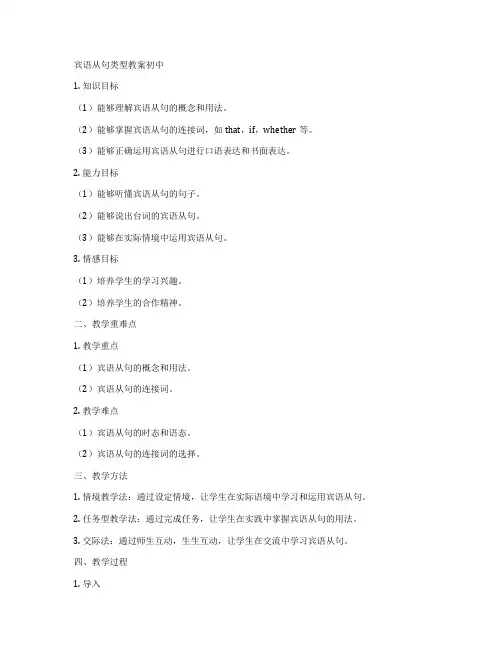
宾语从句类型教案初中1. 知识目标(1)能够理解宾语从句的概念和用法。
(2)能够掌握宾语从句的连接词,如that,if,whether等。
(3)能够正确运用宾语从句进行口语表达和书面表达。
2. 能力目标(1)能够听懂宾语从句的句子。
(2)能够说出台词的宾语从句。
(3)能够在实际情境中运用宾语从句。
3. 情感目标(1)培养学生的学习兴趣。
(2)培养学生的合作精神。
二、教学重难点1. 教学重点(1)宾语从句的概念和用法。
(2)宾语从句的连接词。
2. 教学难点(1)宾语从句的时态和语态。
(2)宾语从句的连接词的选择。
三、教学方法1. 情境教学法:通过设定情境,让学生在实际语境中学习和运用宾语从句。
2. 任务型教学法:通过完成任务,让学生在实践中掌握宾语从句的用法。
3. 交际法:通过师生互动,生生互动,让学生在交流中学习宾语从句。
四、教学过程1. 导入(1)复习相关知识:引导学生复习主语从句,让学生了解从句的分类。
(2)提问:什么是宾语从句?引发学生思考,为新课学习做好铺垫。
2. 呈现(1)展示图片:展示一些关于日常生活的图片,如:学校、家庭、朋友等。
(2)引导学生说出宾语从句:让学生根据图片,尝试用宾语从句来描述图片内容。
3. 教学(1)讲解宾语从句的概念和用法:讲解宾语从句的定义,以及宾语从句在句子中的作用。
(2)讲解宾语从句的连接词:讲解常用的宾语从句连接词,如that,if,whether等。
(3)示例:给出一些宾语从句的示例,让学生观察和理解。
4. 练习(1)口语练习:让学生分组,互相练习使用宾语从句进行对话。
(2)书面练习:让学生完成一些关于宾语从句的练习题。
5. 巩固(1)游戏:设计一个关于宾语从句的游戏,让学生在游戏中巩固所学知识。
(2)小组竞赛:组织小组竞赛,看哪个小组在运用宾语从句方面表现最好。
6. 总结对本节课所学内容进行总结,让学生明确宾语从句的概念和用法。
五、作业布置1. 完成宾语从句的练习题。
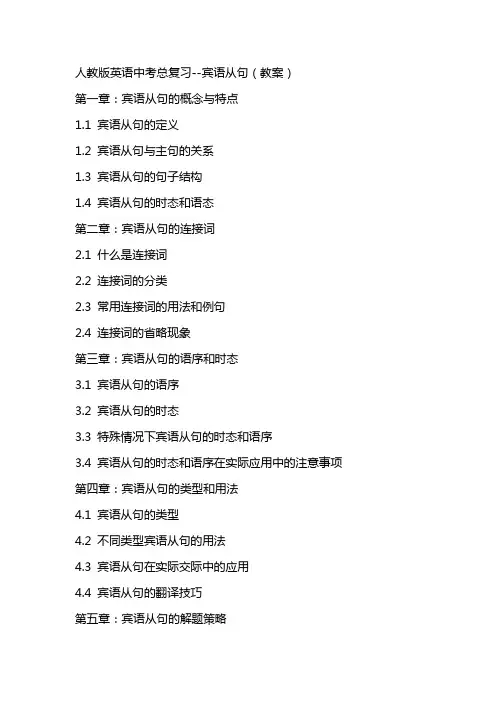
人教版英语中考总复习--宾语从句(教案)第一章:宾语从句的概念与特点1.1 宾语从句的定义1.2 宾语从句与主句的关系1.3 宾语从句的句子结构1.4 宾语从句的时态和语态第二章:宾语从句的连接词2.1 什么是连接词2.2 连接词的分类2.3 常用连接词的用法和例句2.4 连接词的省略现象第三章:宾语从句的语序和时态3.1 宾语从句的语序3.2 宾语从句的时态3.3 特殊情况下宾语从句的时态和语序3.4 宾语从句的时态和语序在实际应用中的注意事项第四章:宾语从句的类型和用法4.1 宾语从句的类型4.2 不同类型宾语从句的用法4.3 宾语从句在实际交际中的应用4.4 宾语从句的翻译技巧第五章:宾语从句的解题策略5.1 宾语从句的题型分析5.2 宾语从句的答题步骤5.3 宾语从句的常见错误分析5.4 提高宾语从句解题能力的练习题及答案解析第六章:疑问词引导的宾语从句6.1 疑问词的作用和种类6.2 疑问词引导宾语从句的用法6.3 疑问词引导宾语从句的例句解析6.4 疑问词引导宾语从句在实际交际中的应用第七章:宾语从句的否定转移7.1 否定转移的概念7.2 宾语从句中的否定转移现象7.3 否定转移的用法和例句7.4 否定转移在实际交际中的应用第八章:宾语从句与主句的逻辑关系8.1 宾语从句与主句的逻辑关系概述8.2 不同类型宾语从句的逻辑关系分析8.3 宾语从句逻辑关系在实际应用中的注意事项8.4 宾语从句逻辑关系练习题及答案解析第九章:宾语从句在阅读理解中的应用9.1 宾语从句在阅读理解中的作用9.2 识别和理解宾语从句的技巧9.3 宾语从句在阅读理解练习中的实例分析9.4 提高阅读理解中宾语从句能力的练习题及答案解析第十章:宾语从句在写作中的应用10.1 宾语从句在写作中的作用10.2 如何在写作中正确使用宾语从句10.3 宾语从句在写作中的实例分析10.4 提高写作中宾语从句能力的练习题及答案解析第十一章:特殊句式的宾语从句11.1 什么是特殊句式的宾语从句11.2 特殊句式宾语从句的用法和例句11.3 特殊句式宾语从句在实际交际中的应用11.4 特殊句式宾语从句的练习题及答案解析第十二章:宾语从句与名词性从句的区别12.1 宾语从句与名词性从句的定义和区别12.2 宾语从句和名词性从句的用法比较12.3 宾语从句与名词性从句的例句解析12.4 宾语从句与名词性从句在实际交际中的应用第十三章:宾语从句的综合练习13.1 宾语从句的综合练习题型13.2 宾语从句综合练习题的解题步骤13.3 宾语从句综合练习题的答案解析13.4 提高宾语从句综合练习题解题能力的策略第十四章:宾语从句在考试中的常见考点分析14.1 宾语从句在考试中的常见考点14.2 宾语从句考点的答题技巧14.3 宾语从句考点的例题解析14.4 宾语从句考点的复习建议第十五章:宾语从句的学习策略和复习方法15.1 宾语从句的学习策略15.2 宾语从句的复习方法15.3 宾语从句的学习资源和练习题推荐15.4 宾语从句的学习进度跟踪和评估重点和难点解析本文主要介绍了宾语从句的概念、特点、连接词、语序和时态、类型和用法、解题策略以及在阅读理解和写作中的应用。
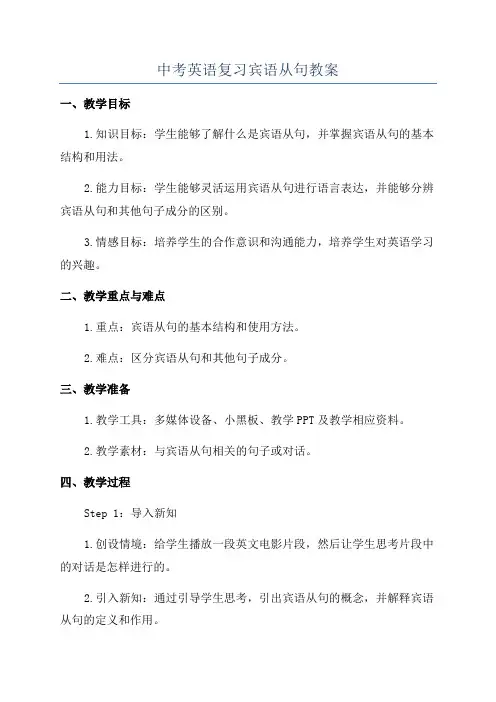
中考英语复习宾语从句教案一、教学目标1.知识目标:学生能够了解什么是宾语从句,并掌握宾语从句的基本结构和用法。
2.能力目标:学生能够灵活运用宾语从句进行语言表达,并能够分辨宾语从句和其他句子成分的区别。
3.情感目标:培养学生的合作意识和沟通能力,培养学生对英语学习的兴趣。
二、教学重点与难点1.重点:宾语从句的基本结构和使用方法。
2.难点:区分宾语从句和其他句子成分。
三、教学准备1.教学工具:多媒体设备、小黑板、教学PPT及教学相应资料。
2.教学素材:与宾语从句相关的句子或对话。
四、教学过程Step 1:导入新知1.创设情境:给学生播放一段英文电影片段,然后让学生思考片段中的对话是怎样进行的。
2.引入新知:通过引导学生思考,引出宾语从句的概念,并解释宾语从句的定义和作用。
3.教师出示宾语从句的基本结构,引导学生熟悉并默写。
Step 2:宾语从句的基本结构1.教师在小黑板上示范写下几个宾语从句的例子,注重主句与从句的连接词和从句的语序。
2.学生跟读并默写宾语从句的基本结构。
Step 3:宾语从句的用法1.提示学生回忆宾语从句在实际应用中的常见使用场景。
2.教师通过多媒体播放宾语从句的相关练习,让学生进行思考和分析,并引导学生总结出宾语从句在不同情景中的使用方法。
Step 4:区分宾语从句和其他句子成分1.教师出示宾语从句和其他句子成分的相关例子,与学生一起分析其中的区别。
2.学生进行练习,判断给定的句子是否为宾语从句。
Step 5:合作学习与巩固练习1.学生分成小组,每个小组分别讨论并完成一组宾语从句的相应练习。
2.小组展示结果,教师对学生的答案进行点评和讲解。
Step 6:拓展延伸与归纳总结1.教师布置拓展性任务或练习题,要求学生在课后完成并书写学习心得。
2.教师进行知识点的总结和归纳。
五、板书设计宾语从句的基本结构连接词+主语+谓语+宾语例如:I know (that) she is a teacher.六、教学反思通过本节课的教学,学生能够掌握宾语从句的基本结构和用法,并且能够分辨宾语从句和其他句子成分的区别。
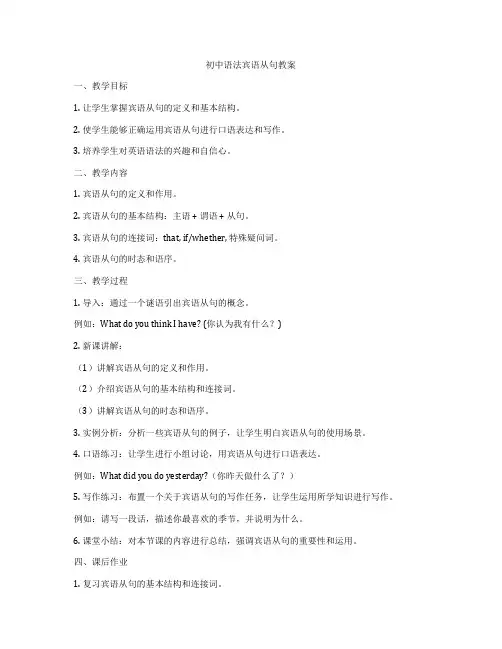
初中语法宾语从句教案一、教学目标1. 让学生掌握宾语从句的定义和基本结构。
2. 使学生能够正确运用宾语从句进行口语表达和写作。
3. 培养学生对英语语法的兴趣和自信心。
二、教学内容1. 宾语从句的定义和作用。
2. 宾语从句的基本结构:主语 + 谓语 + 从句。
3. 宾语从句的连接词:that, if/whether, 特殊疑问词。
4. 宾语从句的时态和语序。
三、教学过程1. 导入:通过一个谜语引出宾语从句的概念。
例如:What do you think I have? (你认为我有什么?)2. 新课讲解:(1)讲解宾语从句的定义和作用。
(2)介绍宾语从句的基本结构和连接词。
(3)讲解宾语从句的时态和语序。
3. 实例分析:分析一些宾语从句的例子,让学生明白宾语从句的使用场景。
4. 口语练习:让学生进行小组讨论,用宾语从句进行口语表达。
例如:What did you do yesterday?(你昨天做什么了?)5. 写作练习:布置一个关于宾语从句的写作任务,让学生运用所学知识进行写作。
例如:请写一段话,描述你最喜欢的季节,并说明为什么。
6. 课堂小结:对本节课的内容进行总结,强调宾语从句的重要性和运用。
四、课后作业1. 复习宾语从句的基本结构和连接词。
2. 完成一个关于宾语从句的练习题。
3. 准备一个关于宾语从句的口头报告。
五、教学评价1. 课堂参与度:观察学生在课堂上的积极参与情况和提问回答。
2. 口语表达:评估学生在口语练习中的表现,是否能正确使用宾语从句。
3. 写作能力:评价学生在写作练习中的表现,是否能正确运用宾语从句。
通过以上教学设计,希望能帮助学生更好地理解和掌握宾语从句,提高他们的英语语法水平。
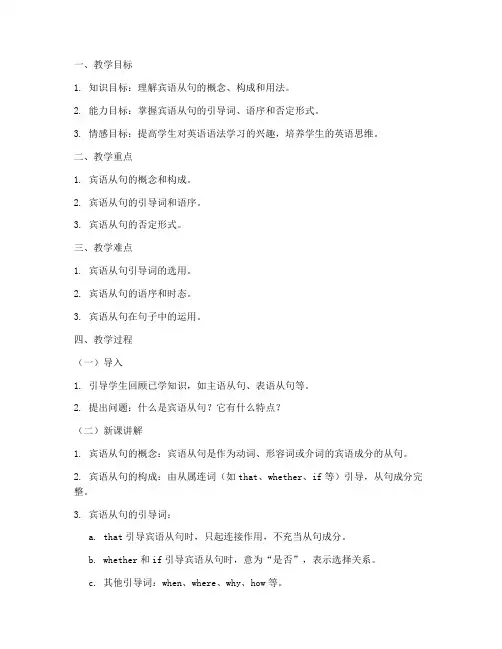
一、教学目标1. 知识目标:理解宾语从句的概念、构成和用法。
2. 能力目标:掌握宾语从句的引导词、语序和否定形式。
3. 情感目标:提高学生对英语语法学习的兴趣,培养学生的英语思维。
二、教学重点1. 宾语从句的概念和构成。
2. 宾语从句的引导词和语序。
3. 宾语从句的否定形式。
三、教学难点1. 宾语从句引导词的选用。
2. 宾语从句的语序和时态。
3. 宾语从句在句子中的运用。
四、教学过程(一)导入1. 引导学生回顾已学知识,如主语从句、表语从句等。
2. 提出问题:什么是宾语从句?它有什么特点?(二)新课讲解1. 宾语从句的概念:宾语从句是作为动词、形容词或介词的宾语成分的从句。
2. 宾语从句的构成:由从属连词(如that、whether、if等)引导,从句成分完整。
3. 宾语从句的引导词:a. that引导宾语从句时,只起连接作用,不充当从句成分。
b. whether和if引导宾语从句时,意为“是否”,表示选择关系。
c. 其他引导词:when、where、why、how等。
4. 宾语从句的语序:与主句保持一致,即陈述语序。
5. 宾语从句的否定形式:在从句中使用否定词(如not、never等)。
(三)课堂练习1. 完成练习题,巩固宾语从句的用法。
2. 小组讨论,互相纠正错误。
(四)课堂小结1. 总结宾语从句的概念、构成和用法。
2. 强调宾语从句在句子中的重要作用。
(五)课后作业1. 复习本节课所学内容。
2. 完成课后练习题。
五、教学反思1. 本节课通过讲解、练习、讨论等多种方式,帮助学生掌握宾语从句的用法。
2. 在教学过程中,关注学生的个体差异,因材施教。
3. 鼓励学生在课后多练习,提高英语语法水平。
范文:一、教学目标1. 知识目标:理解宾语从句的概念、构成和用法。
2. 能力目标:掌握宾语从句的引导词、语序和否定形式。
3. 情感目标:提高学生对英语语法学习的兴趣,培养学生的英语思维。
二、教学重点1. 宾语从句的概念和构成。
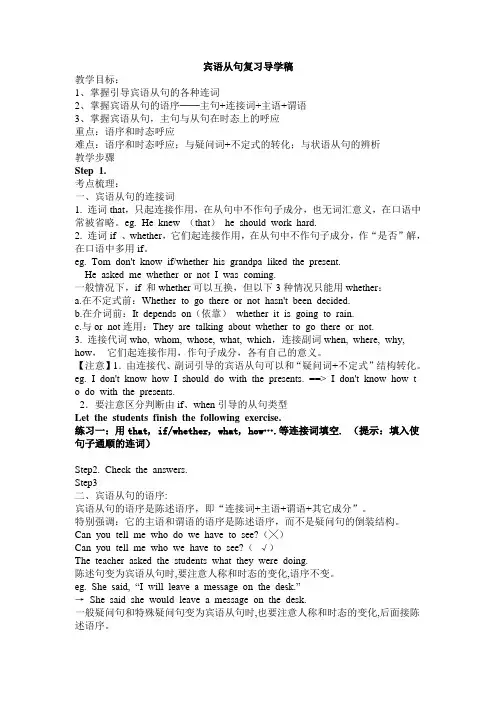
宾语从句复习导学稿教学目标:1、掌握引导宾语从句的各种连词2、掌握宾语从句的语序──主句+连接词+主语+谓语3、掌握宾语从句,主句与从句在时态上的呼应重点:语序和时态呼应难点:语序和时态呼应;与疑问词+不定式的转化;与状语从句的辨析教学步骤Step1.考点梳理:一、宾语从句的连接词1. 连词that,只起连接作用,在从句中不作句子成分,也无词汇意义,在口语中常被省略。
eg. He knew (that)he should work hard.2. 连词if 、whether,它们起连接作用,在从句中不作句子成分,作“是否”解,在口语中多用if。
eg. Tom don't know if/whether his grandpa liked the present.He asked me whether or not I was coming.一般情况下,if 和whether可以互换,但以下3种情况只能用whether:a.在不定式前:Whether to go there or not hasn't been decided.b.在介词前:It depends on(依靠)whether it is going to rain.c.与or not连用:They are talking about whether to go there or not.3. 连接代词who, whom, whose, what, which,连接副词when, where, why, how,它们起连接作用,作句子成分,各有自己的意义。
【注意】1.由连接代、副词引导的宾语从句可以和“疑问词+不定式”结构转化。
eg. I don't know how I should do with the presents. ==> I don't know how t o do with the presents.2.要注意区分判断由if、when引导的从句类型Let the students finish the following exercise.练习一:用that, if/whether, what, how….等连接词填空. (提示:填入使句子通顺的连词)Step2. Check the answers.Step3二、宾语从句的语序:宾语从句的语序是陈述语序,即“连接词+主语+谓语+其它成分”。
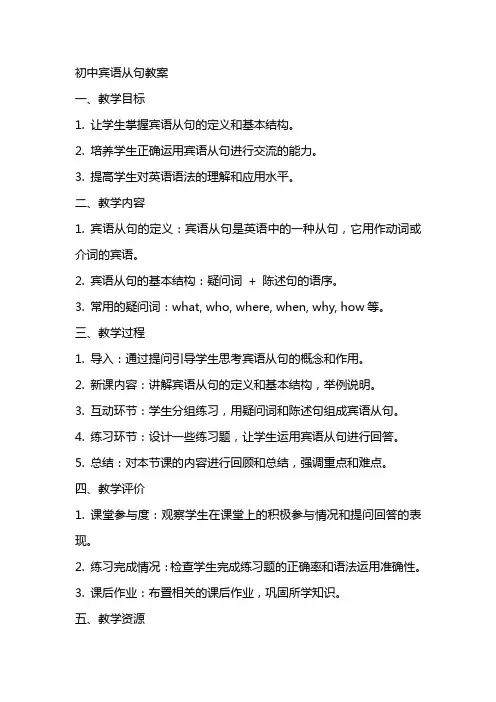
初中宾语从句教案一、教学目标1. 让学生掌握宾语从句的定义和基本结构。
2. 培养学生正确运用宾语从句进行交流的能力。
3. 提高学生对英语语法的理解和应用水平。
二、教学内容1. 宾语从句的定义:宾语从句是英语中的一种从句,它用作动词或介词的宾语。
2. 宾语从句的基本结构:疑问词+ 陈述句的语序。
3. 常用的疑问词:what, who, where, when, why, how等。
三、教学过程1. 导入:通过提问引导学生思考宾语从句的概念和作用。
2. 新课内容:讲解宾语从句的定义和基本结构,举例说明。
3. 互动环节:学生分组练习,用疑问词和陈述句组成宾语从句。
4. 练习环节:设计一些练习题,让学生运用宾语从句进行回答。
5. 总结:对本节课的内容进行回顾和总结,强调重点和难点。
四、教学评价1. 课堂参与度:观察学生在课堂上的积极参与情况和提问回答的表现。
2. 练习完成情况:检查学生完成练习题的正确率和语法运用准确性。
3. 课后作业:布置相关的课后作业,巩固所学知识。
五、教学资源1. 课件:制作精美的课件,展示宾语从句的定义和例子。
2. 练习题:设计一些练习题,包括选择题、填空题和句子改写等。
3. 小组活动:组织学生进行小组活动,促进合作学习。
六、教学策略1. 实例教学:通过具体的例子让学生理解和掌握宾语从句的结构和用法。
2. 互动式教学:鼓励学生积极参与课堂讨论,提问和回答问题,提高口语表达能力。
3. 任务型教学:设计一些实际任务,让学生在完成任务的过程中运用宾语从句。
七、教学活动1. 小组讨论:让学生分组讨论宾语从句的用法,分享各自的观点和经验。
2. 角色扮演:设计一些情景,让学生运用宾语从句进行角色扮演,增强实际应用能力。
3. 写作练习:让学生写一篇小短文,尽量使用宾语从句,培养写作能力。
八、教学难点1. 宾语从句的连接词选择:引导学生正确选择疑问词,使句子表达清晰。
2. 语序的正确性:强调宾语从句的陈述句语序,避免语序错误。
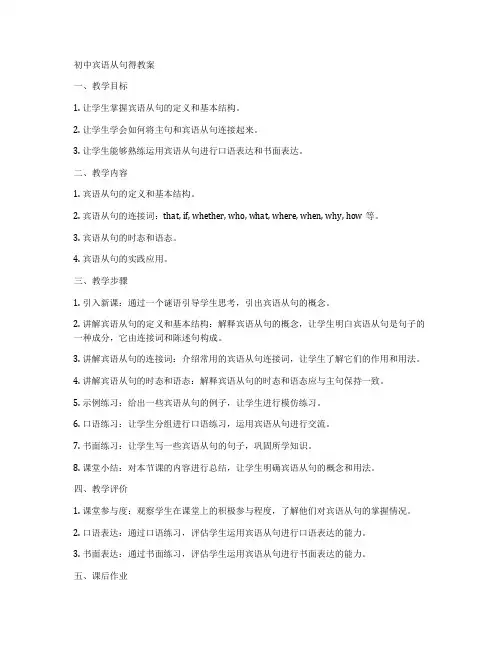
初中宾语从句得教案一、教学目标1. 让学生掌握宾语从句的定义和基本结构。
2. 让学生学会如何将主句和宾语从句连接起来。
3. 让学生能够熟练运用宾语从句进行口语表达和书面表达。
二、教学内容1. 宾语从句的定义和基本结构。
2. 宾语从句的连接词:that, if, whether, who, what, where, when, why, how等。
3. 宾语从句的时态和语态。
4. 宾语从句的实践应用。
三、教学步骤1. 引入新课:通过一个谜语引导学生思考,引出宾语从句的概念。
2. 讲解宾语从句的定义和基本结构:解释宾语从句的概念,让学生明白宾语从句是句子的一种成分,它由连接词和陈述句构成。
3. 讲解宾语从句的连接词:介绍常用的宾语从句连接词,让学生了解它们的作用和用法。
4. 讲解宾语从句的时态和语态:解释宾语从句的时态和语态应与主句保持一致。
5. 示例练习:给出一些宾语从句的例子,让学生进行模仿练习。
6. 口语练习:让学生分组进行口语练习,运用宾语从句进行交流。
7. 书面练习:让学生写一些宾语从句的句子,巩固所学知识。
8. 课堂小结:对本节课的内容进行总结,让学生明确宾语从句的概念和用法。
四、教学评价1. 课堂参与度:观察学生在课堂上的积极参与程度,了解他们对宾语从句的掌握情况。
2. 口语表达:通过口语练习,评估学生运用宾语从句进行口语表达的能力。
3. 书面表达:通过书面练习,评估学生运用宾语从句进行书面表达的能力。
五、课后作业1. 复习宾语从句的概念和用法。
2. 运用宾语从句进行口语表达和书面表达。
3. 预习下节课的内容。
六、教学反思本节课结束后,教师应认真反思教学效果,针对学生的掌握情况,调整教学策略,以提高学生的学习兴趣和实际运用能力。
同时,关注学生的个体差异,因材施教,使每个学生都能在课堂上得到充分的锻炼和提高。
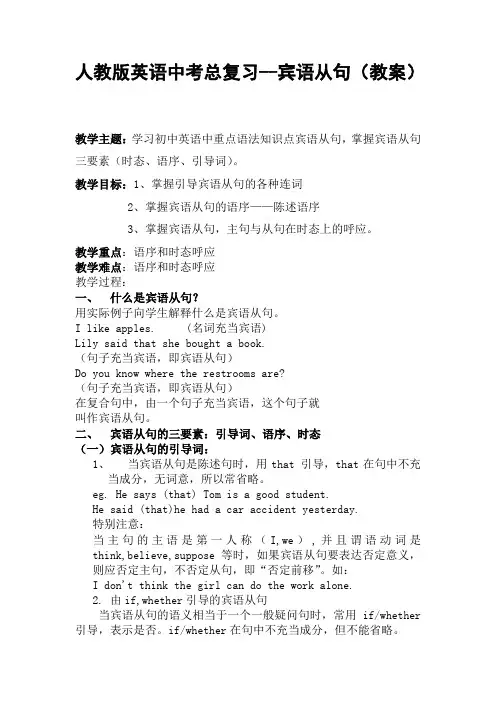
人教版英语中考总复习--宾语从句(教案)教学主题:学习初中英语中重点语法知识点宾语从句,掌握宾语从句三要素(时态、语序、引导词)。
教学目标:1、掌握引导宾语从句的各种连词2、掌握宾语从句的语序——陈述语序3、掌握宾语从句,主句与从句在时态上的呼应。
教学重点:语序和时态呼应教学难点:语序和时态呼应教学过程:一、什么是宾语从句?用实际例子向学生解释什么是宾语从句。
I like apples. (名词充当宾语)Lily said that she bought a book.(句子充当宾语,即宾语从句)Do you know where the restrooms are?(句子充当宾语,即宾语从句)在复合句中,由一个句子充当宾语,这个句子就叫作宾语从句。
二、宾语从句的三要素:引导词、语序、时态(一)宾语从句的引导词:1、当宾语从句是陈述句时,用that 引导,that在句中不充当成分,无词意,所以常省略。
eg. He says (that) Tom is a good student.He said (that)he had a car accident yesterday.特别注意:当主句的主语是第一人称(I,we),并且谓语动词是think,believe,suppose等时,如果宾语从句要表达否定意义,则应否定主句,不否定从句,即“否定前移”。
如:I don't think the girl can do the work alone.2.由if,whether引导的宾语从句当宾语从句的语义相当于一个一般疑问句时,常用if/whether 引导,表示是否。
if/whether在句中不充当成分,但不能省略。
eg. I don't know if/whether she will come here.He asked if/whether she had finished her homework.注意:一般情况下if和whether可以互换,但在以下情况只能用whether。
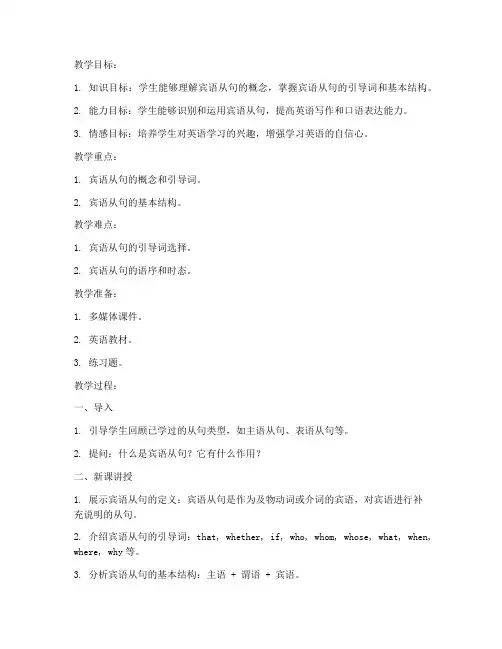
教学目标:1. 知识目标:学生能够理解宾语从句的概念,掌握宾语从句的引导词和基本结构。
2. 能力目标:学生能够识别和运用宾语从句,提高英语写作和口语表达能力。
3. 情感目标:培养学生对英语学习的兴趣,增强学习英语的自信心。
教学重点:1. 宾语从句的概念和引导词。
2. 宾语从句的基本结构。
教学难点:1. 宾语从句的引导词选择。
2. 宾语从句的语序和时态。
教学准备:1. 多媒体课件。
2. 英语教材。
3. 练习题。
教学过程:一、导入1. 引导学生回顾已学过的从句类型,如主语从句、表语从句等。
2. 提问:什么是宾语从句?它有什么作用?二、新课讲授1. 展示宾语从句的定义:宾语从句是作为及物动词或介词的宾语,对宾语进行补充说明的从句。
2. 介绍宾语从句的引导词:that, whether, if, who, whom, whose, what, when, where, why等。
3. 分析宾语从句的基本结构:主语 + 谓语 + 宾语。
三、练习1. 填空练习:根据句子意思,选择合适的宾语从句引导词。
2. 改写句子:将简单句改写为含有宾语从句的复合句。
四、巩固1. 小组讨论:讨论宾语从句在实际语境中的应用。
2. 角色扮演:学生分组进行对话练习,运用宾语从句进行交流。
五、总结1. 回顾本节课所学内容,强调宾语从句的概念、引导词和基本结构。
2. 鼓励学生在日常生活中多运用宾语从句,提高英语表达能力。
教学反思:1. 教师在教学过程中要注重引导,帮助学生理解宾语从句的概念和结构。
2. 通过多种练习方式,提高学生对宾语从句的运用能力。
3. 关注学生的学习反馈,及时调整教学策略,提高教学质量。
课后作业:1. 完成教材中的相关练习题。
2. 选择一篇英语短文,找出其中的宾语从句,并分析其作用。
3. 用宾语从句写一段话,描述自己的一天。
板书设计:一、宾语从句1. 定义:作为及物动词或介词的宾语,对宾语进行补充说明的从句。
2. 引导词:that, whether, if, who, whom, whose, what, when, where, why 等。
初中英语宾语从句教案一、教材分析本节课是根据八年级上册Unit 2的内容设计的宾语从句的教学设计。
本单元主要围绕“宾语从句”这一语法点展开,通过引导学生理解宾语从句的概念、结构和基本用法,培养学生运用宾语从句表达观点、陈述事实的能力。
二、教学目标1. 知识目标:(1)了解宾语从句的概念。
(2)掌握宾语从句的基本结构。
(3)掌握宾语从句的基本用法。
2. 能力目标:(1)能够正确辨别宾语从句的语法结构。
(2)能够熟练运用宾语从句表达观点、陈述事实。
3. 情感目标:培养学生合作意识和团队精神,增强对英语学习的兴趣和自信心。
三、教学重难点1. 教学重点:(1)宾语从句的概念。
(2)宾语从句的基本结构。
(3)宾语从句的基本用法。
2. 教学难点:能够熟练运用宾语从句表达观点、陈述事实。
四、教学准备投影仪、多媒体课件、单词卡片。
五、教学过程Step 1: 导入新课点击播放一个与宾语从句有关的有趣视频,引起学生对宾语从句的兴趣。
Step 2: 引入新知1. 提问:什么是宾语从句?通过引导学生讨论和回答,引导学生逐渐理解宾语从句的概念。
2. 出示宾语从句的定义和基本结构,进行解释和讲解。
宾语从句是由连词引导的从句,在主句中充当宾语的成分。
宾语从句的基本结构是:连接词 + 主语 + 谓语。
3. 出示宾语从句的引导词,并逐个进行解释和例句呈现。
提醒学生注意宾语从句中主谓的一致性。
Step 3: 拓展练习1. 让学生进行一些基础的选择题练习,帮助学生掌握宾语从句的基本结构和用法。
2. 出示一些实际生活中的句子,让学生进行宾语从句的替换练习,培养学生灵活运用宾语从句的能力。
Step 4: 操练和实践1. 将学生分成小组,进行角色扮演,运用宾语从句进行对话练习。
2. 出示一些图片或描述,让学生用宾语从句表达自己的观点或提出问题。
Step 5: 总结归纳通过总结学生在实践中遇到的问题,帮助学生进一步理解和掌握宾语从句的用法。
一、教学目标1. 知识目标(1) 理解宾语从句的定义和基本结构。
(2) 掌握宾语从句的连接词,如that, if, whether等。
(3) 学会在句子中正确运用宾语从句。
2. 能力目标(1) 能听懂、说出道地的英语宾语从句。
(2) 能在实际语境中运用宾语从句进行交流。
3. 情感目标(1) 培养学生的学习兴趣,提高英语语感。
(2) 培养学生合作、探究的学习态度。
二、教学重难点1. 重点:宾语从句的定义、结构和连接词。
2. 难点:宾语从句在实际语境中的应用。
三、教学过程1. 导入:利用图片或情境引出宾语从句的概念。
2. 讲解:讲解宾语从句的定义、基本结构和常用连接词。
3. 举例:给出例句,分析并解释宾语从句的使用。
4. 练习:学生分组练习,运用宾语从句进行对话。
5. 拓展:引导学生探讨宾语从句在实际生活中的应用。
四、课后作业1. 复习宾语从句的定义、结构和连接词。
2. 完成课后练习,运用宾语从句进行写作。
3. 收集生活中的宾语从句实例,进行分享。
五、教学评价1. 课堂参与度:观察学生在课堂上的发言和互动情况。
2. 课后作业:检查学生对宾语从句的掌握程度。
3. 长期效果:关注学生在后续课程中对宾语从句的应用能力。
六、教学内容第六章:宾语从句的时态和语态1. 理解宾语从句的时态和语态。
2. 学会在宾语从句中正确运用时态和语态。
教学过程:1. 导入:通过例句引出宾语从句的时态和语态问题。
2. 讲解:讲解宾语从句的时态和语态的用法。
3. 举例:给出例句,分析并解释宾语从句的时态和语态。
4. 练习:学生分组练习,运用宾语从句的时态和语态进行对话。
七、教学内容第七章:宾语从句的疑问词1. 理解宾语从句中的疑问词。
2. 学会在宾语从句中正确运用疑问词。
教学过程:1. 导入:通过例句引出宾语从句中的疑问词。
2. 讲解:讲解宾语从句中的疑问词的用法。
3. 举例:给出例句,分析并解释宾语从句中的疑问词。
4. 练习:学生分组练习,运用宾语从句中的疑问词进行对话。
一、教案概述本教案旨在帮助学生理解并掌握宾语从句的语法知识,能够正确运用宾语从句进行口语表达和书面写作。
通过本节课的学习,学生将能够理解宾语从句的概念,掌握宾语从句的构成和用法,以及如何将宾语从句应用于实际语境中。
二、教学目标1. 知识目标:理解宾语从句的概念;掌握宾语从句的构成和用法;学会将宾语从句应用于实际语境中。
2. 能力目标:能够正确运用宾语从句进行口语表达和书面写作;能够理解和分析宾语从句的句子结构。
三、教学内容1. 宾语从句的概念:宾语从句是指在句子中作为宾语的从句,它由连接词引导,放在主句的谓语动词之后。
2. 宾语从句的构成:宾语从句由连接词(如:that, if, whether, who, what, where, when, why, how等)引导,连接主句和从句。
从句中通常有谓语动词,构成S+V+O的句子结构。
3. 宾语从句的用法:宾语从句作为宾语出现在主句中,可以用于陈述句、疑问句、感叹句等。
在口语和书面语中广泛应用。
四、教学步骤1. 引入新课:通过一个谜语引出宾语从句的概念,激发学生的学习兴趣。
2. 讲解宾语从句的构成和用法:通过例句讲解宾语从句的构成和用法,让学生理解并掌握宾语从句的语法知识。
3. 互动练习:学生分组进行练习,互相造句,巩固宾语从句的知识。
4. 应用拓展:让学生运用宾语从句进行口语表达和书面写作,提高学生的实际应用能力。
五、课后作业1. 复习宾语从句的语法知识,整理笔记;2. 完成课后练习题,巩固宾语从句的用法;3. 结合自己的生活实际,编写一段含有宾语从句的短文。
六、教学评价1. 课堂参与度:观察学生在课堂上的积极参与情况,以及他们对宾语从句的理解和应用能力。
2. 练习完成情况:检查学生完成练习的情况,评估他们对宾语从句的掌握程度。
3. 课后作业:评估学生完成的课后作业,观察他们能否正确运用宾语从句进行口语表达和书面写作。
七、教学拓展1. 对比宾语从句和其他从句:引导学生了解宾语从句与其他从句(如定语从句、状语从句等)的区别,加深对宾语从句的理解。
人教版英语中考总复习--宾语从句(教案)第一章:宾语从句简介1.1 教学目标了解宾语从句的定义和基本结构掌握宾语从句的连接词1.2 教学内容宾语从句的定义和作用宾语从句的基本结构常用的宾语从句连接词1.3 教学步骤1.3.1 引入通过图片和例子引导学生思考宾语从句的概念1.3.2 讲解讲解宾语从句的定义和作用示范宾语从句的基本结构介绍常用的宾语从句连接词1.3.3 练习让学生分组练习,用所学的连接词构造宾语从句1.4 作业让学生回家后,找一些句子,判断它们是否是宾语从句,并解释原因第二章:宾语从句的语序和时态2.1 教学目标掌握宾语从句的语序和时态2.2 教学内容宾语从句的语序宾语从句的时态2.3 教学步骤2.3.1 引入通过例子引导学生回顾宾语从句的概念2.3.2 讲解讲解宾语从句的语序和时态示例说明宾语从句的语序和时态的使用2.3.3 练习让学生分组练习,构造宾语从句并注意语序和时态的使用2.4 作业让学生回家后,找一些宾语从句的例子,分析它们的语序和时态,并加以练习第三章:宾语从句的连接词3.1 教学目标掌握宾语从句的连接词3.2 教学内容宾语从句的连接词3.3 教学步骤3.3.1 引入通过例子引导学生思考宾语从句的连接词的作用3.3.2 讲解讲解宾语从句的连接词示例说明连接词的使用3.3.3 练习让学生分组练习,用所学的连接词构造宾语从句3.4 作业让学生回家后,找一些宾语从句的例子,分析它们的连接词,并加以练习第四章:宾语从句的用法4.1 教学目标掌握宾语从句的用法4.2 教学内容宾语从句的用法4.3 教学步骤4.3.1 引入通过例子引导学生思考宾语从句的用法4.3.2 讲解讲解宾语从句的用法示例说明宾语从句的用法的场合4.3.3 练习让学生分组练习,用所学的宾语从句构造句子4.4 作业让学生回家后,找一些宾语从句的例子,分析它们的用法,并加以练习第五章:宾语从句的综合练习5.1 教学目标综合运用宾语从句的知识5.2 教学内容宾语从句的综合练习5.3 教学步骤5.3.1 引入通过例子引导学生思考宾语从句的综合运用5.3.2 练习让学生分组练习,用所学的宾语从句知识构造句子5.4 作业让学生回家后,找一些宾语从句的综合练习题,加以练习第六章:宾语从句与主句的关系6.1 教学目标理解宾语从句与主句的关系6.2 教学内容宾语从句与主句的关系6.3 教学步骤6.3.1 引入通过例子引导学生思考宾语从句与主句的关系6.3.2 讲解讲解宾语从句与主句的关系示例说明宾语从句与主句的关系的场合6.3.3 练习让学生分组练习,分析宾语从句与主句的关系6.4 作业让学生回家后,找一些宾语从句的例子,分析它们的与主句的关系,并加以练习第七章:宾语从句的翻译技巧7.1 教学目标掌握宾语从句的翻译技巧7.2 教学内容宾语从句的翻译技巧7.3 教学步骤7.3.1 引入通过例子引导学生思考宾语从句的翻译技巧7.3.2 讲解讲解宾语从句的翻译技巧示例说明宾语从句的翻译技巧的场合7.3.3 练习让学生分组练习,用所学的宾语从句翻译技巧进行翻译7.4 作业让学生回家后,找一些宾语从句的例子,运用所学的翻译技巧进行翻译练习第八章:宾语从句在实际语境中的应用8.1 教学目标学会在实际语境中应用宾语从句8.2 教学内容宾语从句在实际语境中的应用8.3 教学步骤8.3.1 引入通过例子引导学生思考宾语从句在实际语境中的应用8.3.2 讲解讲解宾语从句在实际语境中的应用示例说明宾语从句在实际语境中的应用的场合8.3.3 练习让学生分组练习,在实际语境中应用宾语从句8.4 作业让学生回家后,找一些实际语境,应用宾语从句进行练习第九章:宾语从句的答题技巧9.1 教学目标学会宾语从句的答题技巧9.2 教学内容宾语从句的答题技巧9.3 教学步骤9.3.1 引入通过例子引导学生思考宾语从句的答题技巧9.3.2 讲解讲解宾语从句的答题技巧示例说明宾语从句的答题技巧的场合9.3.3 练习让学生分组练习,运用所学的宾语从句答题技巧进行答题9.4 作业让学生回家后,找一些宾语从句的题目,运用所学的答题技巧进行答题练习第十章:复习与测试10.1 教学目标复习宾语从句的知识点进行测试,巩固所学知识10.2 教学内容宾语从句的知识点复习测试题目10.3 教学步骤10.3.1 引入通过例子引导学生思考宾语从句的知识点10.3.2 复习复习宾语从句的知识点10.3.3 测试进行宾语从句的测试,巩固所学知识10.4 作业让学生回家后,复习宾语从句的知识点,准备下一节课的讲解和讨论重点和难点解析重点环节1:宾语从句的定义和基本结构解析:宾语从句是英语中的一种从句,它起到名词的作用,作为动词或介词的宾语。
初中宾语从句时优秀教案一、教学目标:1. 让学生掌握宾语从句的定义和基本结构。
2. 培养学生正确运用宾语从句进行交流的能力。
3. 提高学生对英语语法的理解和运用能力。
二、教学内容:1. 宾语从句的定义和作用。
2. 宾语从句的基本结构:疑问词 + 陈述句的语序。
3. 宾语从句的时态和语态。
4. 宾语从句的实践运用。
三、教学重点和难点:1. 宾语从句的基本结构。
2. 宾语从句的时态和语态。
3. 宾语从句在实际语境中的运用。
四、教学方法:1. 情境教学法:通过设定各种生活场景,让学生在实际语境中运用宾语从句。
2. 互动教学法:引导学生进行小组讨论和角色扮演,提高学生的参与度和积极性。
3. 任务型教学法:设计各种任务,让学生在完成任务的过程中运用宾语从句。
五、教学步骤:1. 导入:利用图片或故事引导学生思考,引入宾语从句的概念。
2. 讲解:讲解宾语从句的定义、基本结构和时态语态。
3. 示例:给出一些例句,让学生分析并总结宾语从句的特点。
4. 练习:设计一些练习题,让学生巩固宾语从句的知识。
5. 互动:组织小组讨论和角色扮演,让学生在实际语境中运用宾语从句。
6. 任务:设计一些任务,让学生在完成任务的过程中运用宾语从句。
7. 总结:对本节课的内容进行总结,强调宾语从句的重要性和运用。
六、课后作业:1. 复习宾语从句的基本知识和语法规则。
2. 完成课后练习题,巩固宾语从句的运用。
3. 设计一个生活场景,运用宾语从句进行交流。
七、教学评价:1. 课堂参与度:观察学生在课堂上的积极参与情况和互动表现。
2. 练习正确率:检查学生课后练习题的正确率,了解学生的掌握程度。
3. 实际运用:评估学生在生活场景中运用宾语从句的能力。
通过以上教学设计,希望能够帮助学生更好地理解和掌握宾语从句的知识,提高他们在实际语境中的运用能力。
同时,注重培养学生的英语思维和口语表达能力,为他们的英语学习打下坚实的基础。
初中宾语从句复习教案本节课是初中英语宾语从句复习课。
宾语从句是初中英语中重要的语法知识点,内容完整,句型结构较为复杂,主句和从句时态搭配要求严格,在中考试题中频频出现。
复习宾语从句不仅能巩固学生已学的语法知识,还能提高他们的语言运用能力,为高中英语学习打下良好基础。
二、学生分析从平时练习和试卷分析看,学生对宾语从句的应用还欠灵活。
进入初三第二学期后,学生参差不齐的状况更加明显。
优等生基础扎实,但仍缺乏综合运用能力;中等生知识掌握存在夹生饭”问题,有待进一步消化;学困生虽然学习态度较之前端正,但基础甚差,急需补救。
所以他们都需要加强基础知识的训练。
三、教学目标1. 掌握宾语从句的构成和用法。
2. 提高学生运用宾语从句进行表达的能力。
3. 培养学生的团队合作精神和自主学习能力。
四、教学重点与难点1. 教学重点:宾语从句的构成、用法和引导词。
2. 教学难点:宾语从句的时态呼应关系和特殊情况。
五、教学过程1. 导入:通过一个简单的谜语游戏,激发学生的学习兴趣,引导学生进入宾语从句的学习。
2. 新课内容:(1)介绍宾语从句的定义和作用。
(2)讲解宾语从句的构成:陈述句语序、疑问句语序和祈使句语序。
(3)介绍宾语从句的引导词:that、if、whether等。
(4)讲解宾语从句的时态呼应关系:主句和从句时态的一致性。
3. 案例分析:分析一些常见的宾语从句案例,让学生更好地理解宾语从句的用法。
4. 课堂练习:设计一些针对性的练习题,让学生巩固所学知识。
5. 小组讨论:学生分组讨论,总结宾语从句的用法和注意事项。
6. 课堂小结:对本节课的内容进行总结,强调宾语从句的重要性和应用。
7. 课后作业:布置一些有关宾语从句的练习题,让学生巩固所学知识。
六、教学反思本节课结束后,教师应认真反思教学效果,针对学生的掌握情况,调整教学策略,以便更好地提高学生的宾语从句运用能力。
同时,关注学生的学习兴趣和积极性,创设更多的互动环节,提高课堂活力。
宾语从句复习教案目标:掌握宾语从句的用法过程一定义:由一个句子来充当动词的宾语,这样的复合句叫宾语从句。
例如:He can speak English (这是简单句,不是宾语从句)(动词)(名词宾语)He says (that) he can speak English (宾语从句)(动词) (句子宾语)He says(that) he can speak English(主句) (从句)二宾语从句连接词:宾语从句通常由连接词来连接。
(一)由that连接(that在句中不作成分,无意义,可省略)注:所跟从句为陈述句时,用that连接例如:He says. He is a student. (合并为一句)He says ( _______ ) he is a student.(二)由If或whether连接(If/whether当“是否”讲.在句中不作成分,但有意义,不可省略)注:所跟从句为一般疑问句时,用If/whether连接例如:He asks. Is he a student? (合并为一句)He asks________he is a student.注:if和whether引导宾语从句的区别if和whether引导宾语从句通常可互换,但在下列情况下只可用whether。
①介词后的宾语从句②直接与or not连用③在带to的不定式前I’m thinking about_______(whether/if)we should go fishing.I don’t know_________(whether/if)or not he passed the exam.She hasn’t decided_________(whether/if)to go or not.(三)由特殊疑问词who. Whose. Whom. Which. When. Where. How. How many. How long. How soon. How often 等连接。
(这些词在句中作成分,有意义,不可省略)注:所跟从句为特殊疑问句时,用特殊疑问词连接。
例如:He wants to know. When will he come back? (合并为一句)He wants to know__________she will come back.二宾语从句语序:从句用陈述语序例如: 1. He asks if he is a student.(陈述语序)2. He asks if is he a student. (ⅹ)(疑问语序)三宾语从句时态:○1. 当主句谓语动词为现在时态(并非只指一般现在时,也可以是一般将来时,现在进行时等现在时态)时,从句谓语动词用它所需要的任何一种时态。
例如:he ___________( study ) English every dayhe ___________( study ) English nowhe ___________( study ) English tomorrowHe says (that)he ___________( study ) English for five yearshe ___________( study ) English from 8 to 9 yesterday eveninghe ___________( study ) English five days ago○2. 当主句谓语动词为过去时态(并非只指一般过去时,只要是过去的时态形式即可)时,从句谓语动词必须用它所相对应的过去时形式。
例如:he ___________( study ) English every dayhe ___________( study ) English nowhe ___________( study ) English tomorrowHe said (that)he ___________( study ) English for five yearshe ___________( study ) English from 8 to 9 yesterday eveninghe ___________( study ) English five days ago○3. 当从句描述的是事实、真理或格言、谚语时,从句谓语动词的时态不受主句时态的限制,都用一般现在时。
例如:He says ( said ) that the earth __________ ( go ) around the sun.He says ( said ) that it _______ ( be ) better to give than to revieve.注意以下这种结构:Could you tell me when I can leave ?“could”这里表委婉语气,不是指过去时, 所以从句用“can”而不能用“could”。
四宾语从句与简单句的转化:在特殊疑问词及whether引导的宾语从句中,当主句的主语和从句的主语、主句的宾语和从句的主语指同一个人时,从句可以转化成“特殊疑问词+ 动词不定式”或“whether + 动词不定式”的形式,从而使宾语从句成为一个简单句。
例如:I want to know when I will go to Beijing (同义句)I want to know when to go to BeijingShe asked me whether I could finish my homework (同义句)She asked me whether to finish my homework. 祈使句变为引导的宾语从句(将祈使句变为宾语从句时,用ask/tell/order sb (not) to do sth等转述。
)e.g. 1. Mr Green said to his son, “Open the door.”Mr Green told his son to open the door.2. The police shouted to him, “Hands up.”The police ordered him to put up his hands.4、当主句为Could you (please) tell us-----?时,只表示语气,而不表示过去时态。
(注:宾语从句,主要从三个方面考查(三要素) 1. 连接词 2. 语序 3. 时态宾语从句练习题(一):(一)宾语从句通常由以下连词所引导:(1)由_________引导时,它无实义,常省略。
例如:She says ________ she will leave a message. 她说她将留言。
(2)由____或________ 引导。
其意义是_______ 例如:He asked me if/whether I could speak English. 他问我是否会说英语。
I wonder if/whether he is a teacher. 我想知道他是否是一名教师。
(3)由连接代词(what, which, who, whom, whose)或连接副词(how, where, when, why)引导的宾语从句。
例如:I can't understand _________ you said. 我不能理解你说的话。
He wanted to know ______the building would be set up. 他想知道这座楼房何时建成。
(二) 注意宾语从句的语序,无论从句是什么句式,宾语从句必须是_________语序。
Did you hear what I had said?I want to know if the train leaves at six p.m..I don’t know when he arrived.(三)主句与宾语从句的时态关系主句与宾语从句的时态关系有以下三种情况:(1)若主句用了现在时,则宾语从句可用其所需要的任何时态。
例如:I think he often _________ books. ( read ) 我认为他经常读书。
I think he ____________ here tomorrow. ( come) 我认为明天他会来这儿。
He says that they ___________in Tokyo yesterday. (arrive )他说他们昨天到达了东京。
I'm sure that Linda ____________ there before. ( be ) 我确信琳达以前去过那儿。
(2)若主句用了过去时,则宾语从句需用过去时态(一般过去时、过去进行时、过去将来时、过去完成时)的某种形式。
例如:He said he ______ right. ( be ) 他说他是正确的。
He said he ___________ TV at that time. ( watch) 他说在那时他正在看电视。
Tom told me that he ______ to Mount Tai. ( travel ) 汤姆告诉我他将去泰山旅游。
(3)若宾语从句陈述的是客观真理、客观事实、科学原理、格言、谚语等,则不受主句时态的限制,通常用一般现在时。
例如:The teacher told us that the earth ____round the sun. ( move)老师告诉我们地球绕着太阳转。
He said one and one _______ two. ( be) 他说一加一等于二。
(四) if和whether引导宾语从句的区别if和whether引导宾语从句通常可互换,但在下列情况下只可用whether。
①介词后的宾语从句②直接与or not连用③在带to的不定式前I’m thinking about_______(whether/if)we should go fishing.I don’t know_________(whether/if)or not he pas sed the exam.She hasn’t decided_________(whether/if)to go or not.(五) 宾语从句与简单句的转换由特殊疑问句引导的宾语从句,当从句主语与主句主语一致时,宾语从句常简化为____________的形式。
I don’t know what I should do.=I don’t know________ ________ ________.John didn’t decide which book he would buy.=Joh n didn’t decide________ _______ _______ _________.Could you tell me how I can get to the station?=Could you tell me _____ ______ get to the station?Could you tell me where we show our tickets?=Could you tell me______ ______show our tickets?Could you tell me how to get to the nearest underground station?=Could you tell me_______ ________ _______get to the nearest underground station?(注意:做宾语从句的练习时,只要把这三个方面结合起来考虑,一般不会出错。